Hundreds of Montrealers got their veg on at the festival.
After two years, the Montreal vegan festival returned to the Palais des congrès on Oct. 8 and 9.
At this year’s edition of the festival, self-taught cook Loounie (a.k.a. Caroline Huard), the creator of “magic tofu,” was the spokesperson for the event.
Loounie, along with other creators during the weekend, were giving cooking demonstrations. There were also many different vendors on-site, including kiosks that were promoting the vegan Babybel, Cookie Conscious Bakery, PB & Me, and Montreal’s own Aux Vivres restaurant.
The Concordian had the opportunity to speak to the spokesperson herself and find out more about what exactly her creation is.
“My magic tofu is a recipe that I developed like four years ago. I developed it because I was never a big fan of tofu myself. I always thought that it was really high maintenance, you need to press it, marinate it and think about it a few days in advance. So this recipe makes tofu bites that taste like chicken. You can use this tofu in recipes like curries and sandwiches. You can also eat it cold or hot,” Loounie said.
Loounie explained that she sold her “magic tofu” in grocery stores and due to its popularity, as of last year it is no longer available in Metro grocery stores around the province.
If you are interested in trying “magic tofu,” Loounie explained that you can buy it ready-made and ready to eat.
Loounie told The Concordian that she hasn’t been a vegan all her life, and that she doesn’t even come from a vegetarian household.
“I changed my diet 11 years ago because I was a runner back then. I really wanted to eat, I would say a cleaner diet,” Loonie explained, emphasizing “cleaner diet” with air quotes. “The term clean diet is not a term that I relate to anymore. I am very aware of diet culture.”
As Loounie became a plant-based eater, she started to do more research on animal ethics. She was shocked at the results of her findings and wanted to do her part in protecting animals.
Being knowledgeable and doing your homework about veganism and a plant-based lifestyle was a common thread at the festival.
The festival also debunked a lot of myths about the vegan diet itself, one of those myths being that the vegan diet is restrictive.
Walking through the various kiosks, there was a huge selection of different food that attendees could taste.
One kiosk in particular put vegan smoked salmon on display. The smoked salmon was made out of carrots.
The star of the show was the vegan Babybel kiosk. The Concordian spoke with Tess Bouvain, the employee working the kiosk during the weekend, to find out what the Babybel is actually made out of.
“Vegan Babybel is made out of coconut, and then we also have a 100 per cent recyclable packaging,” Bouvain explained.
Alongside the different food items one could try at the festival was the wide array of healthy beverages.
The Concordian was able to speak with Pierrich Picard, the co-founder of Gutsy Kombucha, about the health benefits of kombucha.
“Kombucha is fermented tea, we take tea and mix it with sugar and then we add SCOBY leaves [symbiotic culture of bacteria and yeast]. There’s this good bacteria in these leaves and it creates this drink that is fizzy. The taste is a bit vinegary and we add some flavours to it, ” Picard explained.
Picard also made a point in addressing that kombucha is a way healthier alternative than the regular energy drink that most students would reach for.
“You are putting a lot of good bacterias in your gut. It’s like sending some soldiers to war to fight against the bad bacterias. It’s full of organic enzymes. You get more out of your food,” Picard said.
The festival as a whole was just a great resource for learning more about plant-based diets and getting to know more about health in general.
